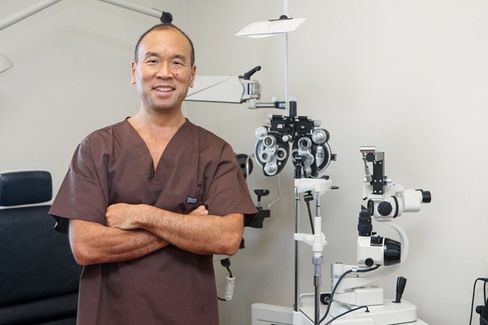Treating Age-Related Macular Degeneration
Age-related macular generation, also known as AMD, affects approximately 1.75 million Americans. Although it does not cause total blindness, it can cause blind spots in your central vision. Dr. Jason H. Nakagawa in Marina Del Rey, CA, can diagnose the condition through a series of specialized tests. He can then prescribe antioxidant therapy for patients suffering from dry AMD (the milder form of the disease), or refer those suffering from wet AMD (the more urgent form) to a specialist.

What Is AMD?
The macula is located at the center of the retina. It is made up of millions of light-sensitive cells responsible for central vision. When AMD affects the macula, it can cause blurriness or blind spots and a compromised ability to perceive brightness or colors.
There are two types of AMD:
- Dry AMD is the most common type. It is characterized by the presence of drusen (yellow or white fatty protein deposits) that appear under the macula, causing gradual deterioration and increasingly compromised central vision.
- Wet AMD is less common than dry AMD and more severe. It occurs when blood vessels form under the macula, causing it to bulge and separate from the retina. This effect can quickly and permanently compromise central vision.
AMD has very few symptoms in its earliest stages. Therefore, it is important to visit our practice for regular eye examinations, especially if you are considered an at-risk patient.
Because advanced age makes you more susceptible to certain eye diseases like AMD, it is important to schedule regular eye exams. We offer conservative, effective treatment options.
Risk Factors
Certain factors can increase your risk of developing AMD, including:
- Being over the age of 60
- Smoking
- Caucasian ethnicity
- Genetic disposition
Making healthy lifestyle choices such as quitting smoking, exercising regularly, and eating a healthy diet can reduce your risk of AMD or slow down the disease once it has developed.
Diagnosing AMD
To diagnose AMD, Dr. Nakagawa will begin by dilating your pupils. He will examine the inside of your eye using a special lens. To assess the health of the blood vessels and your retina, he may perform fluorescein angiography. While the fluorescein travels through the blood vessels of your eye, he will take photos that will help him identify any abnormalities.
During the AMD test, Dr. Nakagawa will also look for the presence and prominence of drusen. Typically, the size and number of drusen residing under your retina will determine whether you have early, intermediate, or late AMD.
How To Manage the Condition
For most patients with AMD, Dr. Nakagawa recommends treatment with antioxidants. Antioxidants have been shown to reduce the risk of vision loss and slow the progression of the disease. Two studies were conducted by the National Eye Institute to assess the effectiveness of treatment among those at a high risk of developing advanced AMD. The first study found that those who took antioxidant vitamins reduced their risk of developing advanced AMD by approximately 25 percent. Those studied also reduced vision loss by 19 percent.
If you are diagnosed with wet AMD, Dr. Nakagawa will also refer you to the Jules Stein Eye Institute at UCLA. Their specialists can determine whether laser treatment or other solutions are necessary, and Dr. Nakagawa will coordinate with them to co-manage your condition.
Protect Your Vision
We offer conservative, effective treatment options for AMD. To schedule your eye exam, call us at (310) 340-6925 or request an appointment online.
Dr. Jason H. Nakagawa

Dr. Nakagawa has been practicing optometry since 1994. He is a member of multiple prestigious organizations, including:
- American Academy of Optometry
- American Optometric Association
- National Optometric Association
- The National Association of Patient Practitioners
- American Diabetes Association
